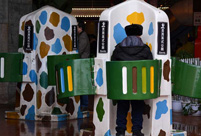


Doctor Wang Yunde from the Zhangqiu No 2 People's Hospital evaluates an elderly patient at a nursing home in Jinan, East China's Shandong province, on March 1, 2016. [Photo/Xinhua]
Seniors are living longer but have more disabilities, new survey finds
The aging of China's population will present serious challenges in the decades ahead, particularly in healthcare, according to the China Longitudinal Aging Social Survey conducted by Renmin University of China's National Survey Research Center.
About 11,000 seniors from 134 counties and districts responded to the survey, which was released over the weekend.
More than 75 percent of the survey respondents reported suffering from chronic diseases such as hypertension, heart disease, diabetes and arthritis.
By the end of last year, China had 222 million seniors, more than 4.4 million of whom suffer from severe disabilities that require long term care.
Deteriorating mental health was another concern, with 25 percent of seniors polled saying they were lonely and half saying they lived on their own with no children to care for them.
China's population, on average, is expected to become significantly older between 2022 and 2040 as members of the country's baby boom generation become senior citizens.
This aging, coupled with a labor shortage, could be the greatest demographic challenge China has ever faced, according to Zhai Zhenwu, professor of sociology and population studies at Renmin University of China in Beijing.
"The universal second-child policy introduced late last year will delay this trend but cannot reverse it," Zhai said.
According to Du Peng, a professor of gerontology who led the survey, "it's an aging society but not very old."
Although the effects of aging are manageable at present, Du said, baby boomers will propel China toward becoming an intensively aging society in the coming years.
China's last baby boom started in the early 1960s and lasted until the 80s, with an average of more than 20 million children born every year.
It peaked in 1963, when about 29 million children were born, and came to an end when the recently rescinded one-child policy was introduced. Last year, China had 16.5 million newborns, government data show.
According to the survey, seniors are living longer but are also suffering from various disabilities that can create a heavy burden for their families and society in general.
Du suggested that the government adopt measures that would help counteract the effects of the aging population.
"Long-term care insurance could be a major tool in this regard," he said.
 China has world's largest high-speed rail network
China has world's largest high-speed rail network Top beauties in Chinese provinces
Top beauties in Chinese provinces 600 people attend Lusheng playing contest in S China
600 people attend Lusheng playing contest in S China Engineer troop builds bridge in real combat conditions
Engineer troop builds bridge in real combat conditions You can urinate in public in Chongqing
You can urinate in public in Chongqing Rice terrace scenery in southwest China's Yunnan
Rice terrace scenery in southwest China's Yunnan 2016 Miss Chinatown USA pageant held in San Francisco
2016 Miss Chinatown USA pageant held in San Francisco Ancient pagodas across China
Ancient pagodas across China Wedding dress show up in the air
Wedding dress show up in the air Top 20 hottest women in the world in 2014
Top 20 hottest women in the world in 2014 Top 10 hardest languages to learn
Top 10 hardest languages to learn 10 Chinese female stars with most beautiful faces
10 Chinese female stars with most beautiful faces China’s Top 10 Unique Bridges, Highways and Roads
China’s Top 10 Unique Bridges, Highways and Roads Harris is making waves in S.China Sea
Harris is making waves in S.China Sea With new plant, Airbus seeks to secure China market share
With new plant, Airbus seeks to secure China market share Chinese sound off on America’s loudest presidential hopeful
Chinese sound off on America’s loudest presidential hopeful 40 years after Cultural Revolution, repentance of Red Guards is still rare
40 years after Cultural Revolution, repentance of Red Guards is still rareDay|Week